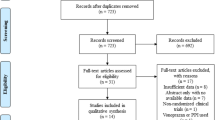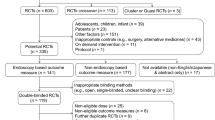Abstract
The evidence regarding the efficiency of potent gastric acid inhibition is exposed after a systematic search and a critical evaluation of its quality, using a specific score. The aim was to review alternative options, in economic terms, especially related with gastro-oesophageal reflux disease. The results show that the superiority of the proton pump inhibitors over the histamine H2 receptor antagonist is clear in moderate and severe oesophagitis and in patients with persistent or severe symptoms. This evidence is clearly related with the intensity of the gastric inhibition. An associated benefit is the improvement of the quality of life obtained with this potent gastric acid inhibition profile.


Similar content being viewed by others
References
Critical Appraisal Skills Programme España (CASPe). 11 preguntas para dar sentido a una evaluación económica [http://www.redcaspe.org/herramientas/lectura/11economica.pdf].
Carballo F. Tratamiento a largo plazo de la ERGE. Análisis coste-efectividad del tratamiento farmacológico (a demanda y continuo) y del tratamiento quirúrgico. Gastroenterol Hepatol 2001; 24 Suppl 2: 54–60
Eggleston A, Wigerinck A, Huijghebaert S, et al. Cost effectiveness of treatment for gastro-esophageal reflux disease in clinical practice: a clinical database analysis. Gut 1998; 42: 13–6
Perras C, Otten N. Pharmaceutical management of gastro-esophageal reflux disease — summary. Technology Overview. Ottawa: Canadian Coordinating Office for Health Technology Assessment; 1996.
Goeree R, O’Brien B, Hunt R, et al. Economic evaluation of long-term management strategies for erosive esophagitis. Pharmacoeconomics 1999; 16: 679–97
Hillman AL, Bloom BS, Fendrick AM, et al. Cost and quality effects of alternative treatments for persistent gastroesophageal reflux disease. Arch Intern Med 1992; 152: 1467–72
Hillman AL. Economic analysis of alternative treatments for persistent gastro-esophageal reflux disease. Scand J Gastroenterol Suppl 1994; 201: 98–102
Harris RA, Kuppermann M, Richter JE. Proton pump inhibitors or histamine-2 receptor antagonists for the prevention of recurrences of erosive reflux esophagitis: a cost-effectiveness analysis. Am J Gastroenterol 1997; 92: 2179–87
Stalhammar NO, Carlsson J, Peacock R, et al. Cost effectiveness of omeprazole and ranitidine in intermittent treatment of symptomatic gastro-esophageal reflux disease. Pharmacoeconomics 1999; 16: 483–97
Holzer SS, Juday TR, Joelsson B, et al. Determining the cost of gastroesophageal reflux disease: a decision analytic model. Am J Manage Care 1998; 4: 1450–60
Sonnenberg A. Cost effectiveness of competing strategies to prevent or treat GORD-related dysphagia. Pharmacoeconomics 2000; 17: 391–401
Stal JM, Gregor JC, Preiksaitis HG, et al. A cost-utility analysis comparing omeprazole with ranitidine in the maintenance therapy of peptic esophageal stricture. Can J Gastroenterol 1998; 12: 43–9
Gerson LB, Hatton BN, Ryono R, et al. Clinical and fiscal impact of lansoprazole intolerance in veterans with gastro-esophageal reflux disease. Aliment Pharmacol Ther 2000; 14: 397–406
Kaplan-Machlis B, Spiegler GE, Zodet MW, et al. Effectiveness and costs of omeprazole vs ranitidine for treatment of symptomatic gastroesophageal reflux disease in primary care clinics in West Virginia. Arch Fam Med 2000; 9: 624–30
Dean BB, Siddique RM, Yamashita BD, et al. Cost-effectiveness of proton-pump inhibitors for maintenance therapy of erosive reflux esophagitis. Am J Health Syst Pharm 2001; 58: 1338–46
Meineche-Schmidt V, Juhl HH, Ostergaard JE, et al. Costs and efficacy of three different esomeprazole treatment strategies for long-term management of gastro-esophageal reflux symptoms in primary care. Aliment Pharma-col Ther 2004; 19: 907–15
Raghunath AS, Green JR, Edwards SJ. A review of the clinical and economic impact of using esomeprazole orlansoprazole for the treatment of erosive esophagitis. Clin Ther 2003; 25: 2088–101
Wahlqvist P, Junghard O, Higgins A, et al. Cost effectiveness of proton pump inhibitors in gastro-esophageal reflux disease without esophagitis: comparison of on-demand esomeprazole with conventional omeprazole strategies. Pharmacoeconomics 2002; 20: 267–77
Wahlqvist P, Junghard O, Higgins A, et al. Cost effectiveness of esomeprazole compared with omeprazole in the acute treatment of patients with reflux esophagitis in the UK. Pharmacoeconomics 2002; 20: 279–87
Dimenas E, Glise H, Hallerback B, et al. Quality of life in patients with upper gastrointestinal symptoms. An improved evaluation of treatment regimens? Scand J Gastroenterol 1993; 28: 681–7
Glise H. Quality of life and cost of therapy in reflux disease. Scand J Gastroenterol Suppl 1995; 210: 38–42
van Pinxteren B, Numans ME, Bonis PA, et al. Short-term treatment with proton pump inhibitors, H2-receptor antagonists and prokinetics for gastro-esophageal reflux disease-like symptoms and endoscopy negative reflux disease [Cochrane Review]. The Cochrane Library, Issue 1. Oxford: Update Software; 2001.
Condra LJ, Morreale AP, Stolley SN, et al. Assessment of patient satisfaction with a formulary switch from omeprazole to lansoprazole in gastroesophageal reflux disease maintenance therapy. Am J Manage Care 1999; 5: 631–8
Talley NJ, Lauritsen K, Tunturi-Hihnala H, et al. Esomeprazole 20 mg maintains symptom control in endoscopy-negative gastro-esophageal reflux disease: a controlled trial of ‘on-demand’ therapy for 6 months. Aliment Pharmacol Ther 2001; 15: 347–54
Sridhar S, Huang J, O’Brien BJ, et al. Clinical economics review: cost-effectiveness of treatment alternatives for gastro-esophageal reflux disease. Aliment Pharmacol Ther 1996; 10: 865–73
Thomson AB, Chiba N, Armstrong D, et al. The Second Canadian Gastroesophageal Reflux Disease Consensus: moving forward to new concepts. Can J Gastroenterol 1998; 12: 551–6
Fennerty MB. Medical treatment of gastroesophageal reflux disease in the managed care environment. Semin Gastrointest Dis 1997; 8: 90–9
Hirth RA, Bloom BS, Chernew ME, et al. Patient, physician, and payer perceptions and misperceptions of willingness to pay for diagnostic certainty. Int J Technol Assess Health Care 2000; 16: 35–49
Sadowski D, Champion M, Goeree R, et al. Health economics of gastroesophageal reflux disease. Can J Gastroenterol 1997; 11 Suppl B: 108B–12B
Author information
Authors and Affiliations
Corresponding author
Rights and permissions
About this article
Cite this article
Álvarez, F.C. Efficiency of Potent Gastric Acid Inhibition. Drugs 65 (Suppl 1), 105–111 (2005). https://doi.org/10.2165/00003495-200565001-00014
Published:
Issue Date:
DOI: https://doi.org/10.2165/00003495-200565001-00014




